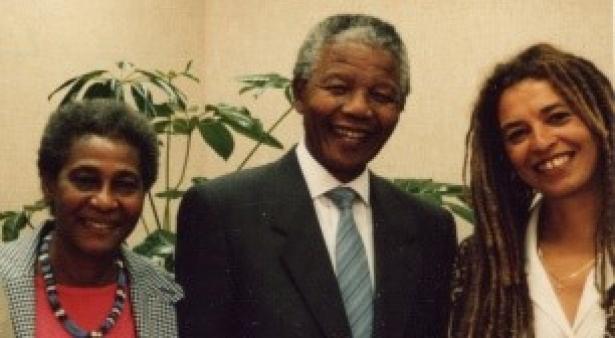Charlene (Alexander) Mitchell, a key leader of the movement in the early 1970s to free imprisoned activist Angela Davis died December, 14 at age 92 in New York City’s Amsterdam Nursing Home of natural causes. Mitchell was also a candidate for the U.S. presidency in 1968 on the U.S. Communist Party ticket.
She was widely regarded as the central architect and organizer of the worldwide movement for Davis’s freedom. Davis, a university professor and Communist political activist, was charged with murder, conspiracy and kidnapping after a failed takeover of a courtroom in Marin County, California, resulted in the death of four people. Davis was not present, but guns used in the attempt by Jonathon Jackson, the brother of prisoner George Jackson, were registered in Davis’s name. After a 16-month imprisonment and trial, a jury acquitted Davis on all charges.
On learning of Mitchell’s death, Davis said:
“Having known Charlene Mitchell through political victories and defeats, through personal tragedies and triumphs, I can say with confidence that she is the person to whom I am most grateful for showing me a life path.
What I have most appreciated over these years is her amazing ability to discover ethical connections between the political and the personal, the global and the local. I don’t think I have ever known someone as consistent in her values, as collective in her outlook on life, as firm in her trajectory as a freedom fighter.”
Out of the campaign to free Davis, Mitchell helped found and lead the National Alliance Against Racist and Political Repression, a multi-racial organization that campaigned for the freedom of “victims of racist and political repression.” Among the Alliance’s most celebrated cases was that of Joan Little, an African-American woman who was acquitted in 1974 on the charge of murdering a North Carolina prison guard who had attempted to rape her.
The Alliance also helped to win the eventual freedom of the Wilmington 10, the Rev. Benjamin Chavis, eight high-school students and a counselor, who were wrongfully convicted of firebombing a white-owned grocery store in Wilmington, North Carolina in 1971. Their sentences ranged from 15 to 34 years. The ten spent nearly a decade in prison before federal appellate courts overturned their convictions in December 1980, citing prosecutorial misconduct. Rev. Chavis subsequently led the national NAACP.
In the early 1990s Mitchell was elected leader of the Committees of Correspondence for Democracy and Socialism, a Marxist organization formed to address the challenging changes within the socialist movement.
She maintained close ties with leaders and activists in socialist and liberation movements throughout the world, including in Cuba and South Africa. She was a leader of the Anti-Apartheid movement and an invited observer of the election of Nelson Mandela, with whom she shared a friendship.
Charlene Alexander was born on June 8, 1930 in Cincinnati, Ohio to Charles Alexander and Naomi Taylor. She was the 2nd of 8 children. Both parents were working class activists. Mitchell followed suit and worked on anti-racist campaigns in her early teens. By then, the family had moved to Chicago. It was there that Mitchell joined the CPUSA at 16.
She later rose to the CPUSA’s highest bodies while raising a son, Steven, who was born a year after her 1950 marriage to Bill Mitchell. Prior to her 1968 presidential candidacy, Mitchell led a branch of the Communist Party in Los Angeles, the Che-Lumumba club, which was highly regarded within the city’s Black community.
In 1996, Mitchell was hired as special assistant to Charles Ensley, president of New York City’s Social Service Employees Union, Local 371, the progressive welfare workers’ union in District Council 37 of the American Federation of State, County and Municipal Employees.
Mitchell was slowed in 2007 when she suffered a stroke that left her partially paralyzed and impeded her speech. She is survived by her son, Steven Mitchell, and brothers Deacon Alexander and Mike Wolfson.


Spread the word